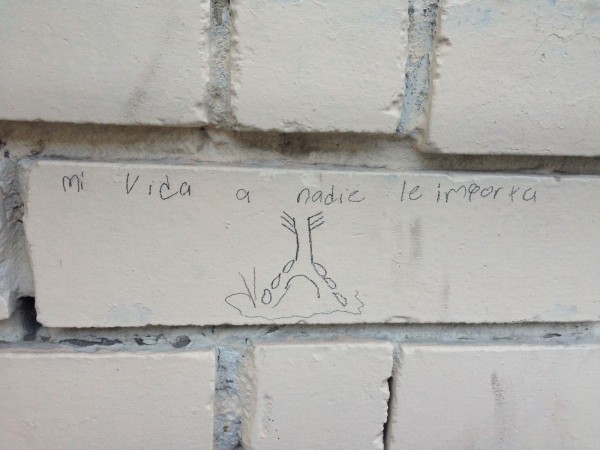
A few days ago, I noticed, by chance, a tiny bit of graffiti made with pencil on a brick of the outside wall of a school in the El Pesebre neighborhood of Bogotá. The phrase was written in small print, clearly childish, but it could be read without difficulty: “No one cares about my life.” And below the letters, occupying the whole height of the brick, more or less below the word “nobody,” the simple drawing of eyes shedding tears above a sad, inverted U-shaped mouth. I was so struck by this, I took out my phone and took a picture.
I will never know who was the author of this street art, that with the passage of time, or after the first rains that fall on the city, will be erased. But it is easy to imagine the scene: the boy or the girl —let’s imagine that she is a girl, and let’s say that she is eight or nine years old— leaves her classroom with sorrowful eyes, at the end of the school day. The companions go, each to his house. She is alone in the street; the pain overwhelms her, who knows what sadness and turmoil cloud her joy? And then, before she continues with a slow and self-absorbed pace towards her home —where perhaps the reasons of her anguish live— she stops. She has had an idea. She looks up and down the street: no one. She pulls out a pencil from her school bag and writes her concise message on the wall: “No one cares about my life.” Then she completes the sentence with the scribble of a weeping face. Perhaps when she is done she contemplates her work —her cry— for a few seconds. Then she saves the pencil and leaves, maybe a little relieved.
I am impressed by the gesture and the message.
First of all, the gesture: to write rage on a wall is undoubtedly due to the fact that the graffiti writer felt, at least at the time, that the wall was her only interlocutor, that is, she had no one of flesh and bone with whom to share her sorrows. At the same time, recording her frustration on a neighborhood wall was a way to make her voice heard: “Someone will read me,” the girl must have thought. “That my confession has no signature and nobody knows that it was me who wrote it is the least important: someone will read and know that here, there is someone whose life does not matter.”
And I am struck also by the message, which sums up in six words a drama that is, of course, the drama of many people: the weight of their own irrelevance, the feeling that they matter to no one. Neither to parents (are they absent?) nor to other relatives, or to friends, or teachers…
Is it true that nobody cares about this girl’s life? I do not know. However, I know that she feels this way. And I know that this small bit of graffiti, which is a lament, a cry and a complaint all at the same time, condenses perfectly the expression of a fundamental human yearning, which we would do well not to forget or lose sight of: the legitimate yearning for relevance, to desire to matter to someone, of not being treated as if completely insignificant.
The anonymous protest of this girl helps us to understand that few things are so critical in our relationship with others as to communicate how much we care about them. It is not a question of offering, artificially, forced declarations of love. But between this, and never saying that we love each other, it is better to sin by excess. Let us humbly acknowledge our need to be loved. Let us not be stingy in our manifestations of affection. They cost nothing, and yet they can transform lives.









